How To Make Homemade Spaghetti Sauce From Scratch
Homemade Spaghetti Sauce is so full of flavor, and it’s easy to make in large batches for freezing or canning for easy make-ahead meals.
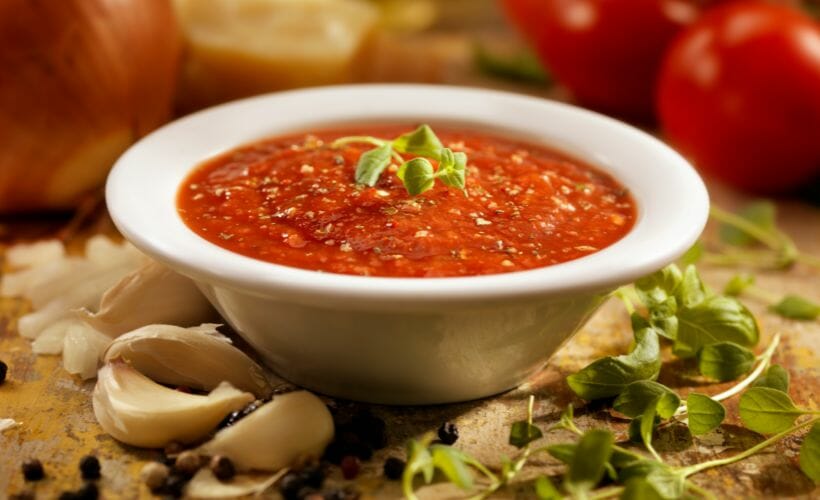
The only thing better than homemade spaghetti sauce made from scratch is homemade spaghetti sauce made from homegrown tomatoes from your very own garden.
Although you could use any tomato, Roma, and other paste tomatoes with meaty textures with little to no seeds, they have the best flavor when cooked into a delicious sauce. San Marzano tomatoes are my personal favorite because of their bright red color that carries over to the sauce, and they have fewer seeds than traditional Romas.
Did you know you can make your own pasta? A Farmish Kind of Life shows you how easy it is to make homemade noodles.
The recipe below is for a large batch of sauce for canning (6 pints). Scroll down to the recipe card for a dinner’s worth of sauce.
Ingredients for The Best Homemade Spaghetti Sauce
Fresh Paste Tomatoes
A 28-oz can of tomatoes is equivalent to approximately 2 pounds of tomatoes if you choose to use canned instead of fresh. You will need 18 lbs of tomatoes for this canning recipe.
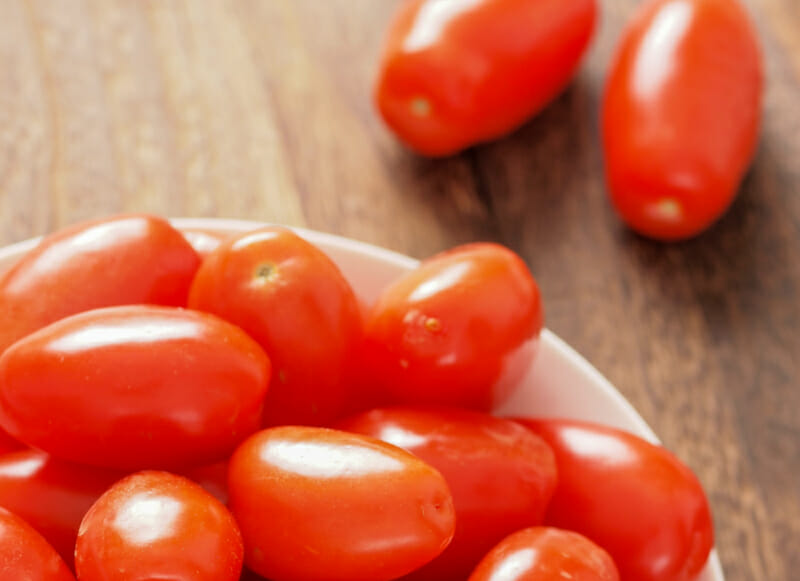
Roasted Red Peppers
You can use jarred roasted red peppers. However, you can absolutely roast your own peppers if you prefer. This method from Project Meal Plan is my favorite lazy way. You will need 6 red peppers for this recipe.
Onions
I used a white onion, but you can use any onion that you have on hand. White onions are milder and crisper than yellow. Red onions are fairly similar to yellow onions in flavor, though their layers are slightly less tender and meaty. You will need 2 large onions for this recipe.
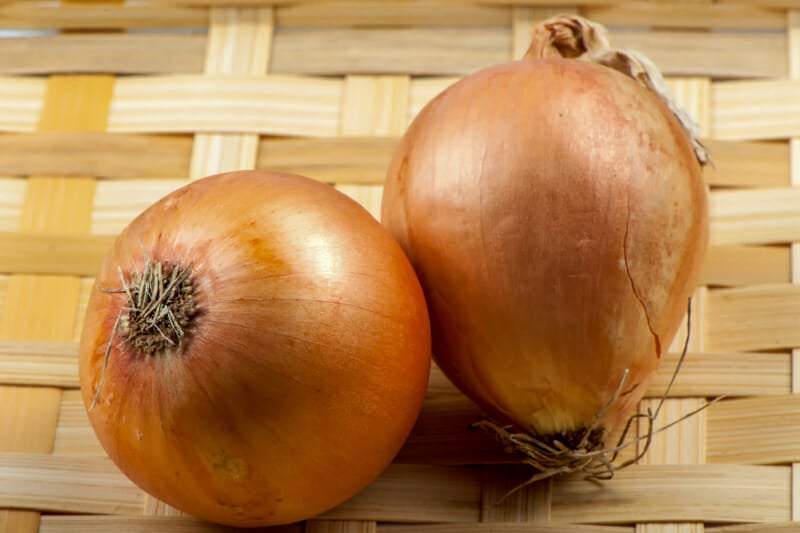
Salt
I prefer pink Himalayan salt because the way it’s harvested allows it to possess many other minerals and trace elements not found in regular table salt. Is it healthier? Well, that’s debatable. Salt is still salt. You will need 3 teaspoons of salt for this recipe.
Olive Oil
Not all olive oil is created equally. Here are the things to keep in mind when you’re purchasing your next bottle of olive oil:
- Only buy oil labeled extra-virgin because it’s less processed than light or generic olive oil.
- Avoid anything in a clear glass bottle because light affects the flavor and aroma.
- Olive oil isn’t wine and doesn’t improve with age. Fresher is always better, so buying in smaller bottles is wise.
You will need 6 tablespoons of olive oil for this recipe.
Tomato Paste
The secret to making tomato spaghetti sauce taste extra special is the kind of tomato paste used. Anyone can make their own homemade tomato paste, giving their best-loved spaghetti sauce an extra special flavor. Learn to make it here. You will need 6 tablespoons of tomato paste for this recipe.
Garlic
Garlic falls into two primary categories: hardneck and softneck. If you’re planting garlic in your garden and you live in a mild climate that doesn’t get hard freezes in winter, go for softneck garlic. If your winters are very cold, choose a hardneck garlic, which flourishes in zone 4 and below. Either garlic choice works beautifully in this recipe. You will need 6 cloves of garlic for this recipe.
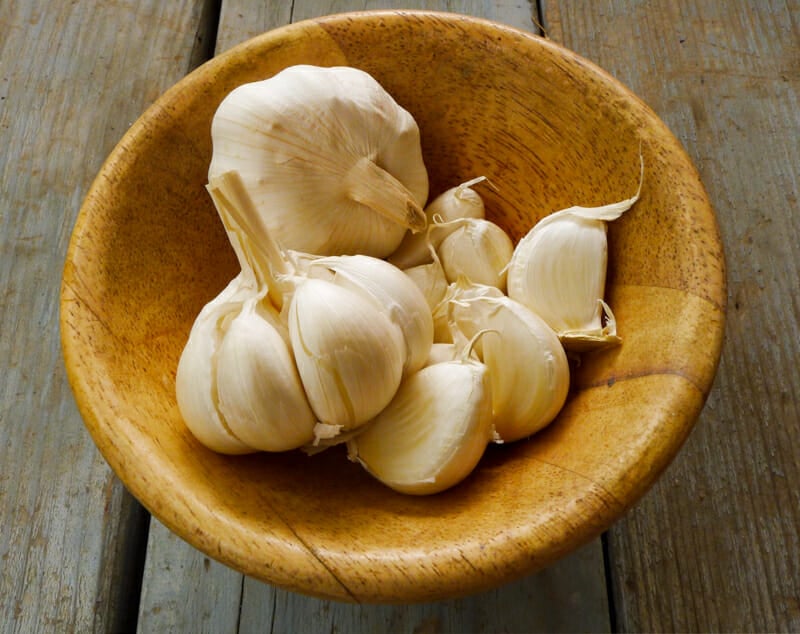
Basil
A basil sprig is a top cluster on a stem including 3 or 4 leaves. If you’re growing basil indoors in a pot, getting your hands on some sprigs is easy. You will need 6 fresh basil sprigs for this recipe. If you’re buying fresh basil at the grocery store, a .5oz package will do the trick.
Bay Leaves
Fresh bay leaves have a notably bitter taste and pungent aroma, but dried bay leaves take on more herbal notes reminiscent of thyme and oregano. Due to this flavor difference, bay leaves are best used in their dried form. You will need 6 dried bay leaves for this recipe.
How to Make Homemade Spaghetti Sauce
Prepare Your Onions and Garlic
Line a baking sheet with parchment paper. Place two large quartered onions and 6 peeled garlic cloves on the baking sheet, and drizzle with olive oil.
Roast at 375°F until the onions are tender and golden brown. Transfer the roasted onions and garlic to a blender or food processor when done roasting, along with 6 roasted red peppers (or a 12 oz jar, drained). Blend until smooth.
Prepare Your Tomatoes
Peel 18-lbs tomatoes using this quick method. Cut tomatoes in half horizontally and squeeze out the seeds. Cut tomato halves a second time to form quarters.
Add Tomatoes and Seasonings
Put quartered tomatoes in a large pot over medium-high heat. Pour in the onion and garlic puree. Add 3 teaspoons of salt, 6 tablespoons of olive oil, 6 tablespoons of tomato paste, 6 sprigs of fresh basil, and 6 dried bay leaves. Bring to a boil, then lower the heat to a brisk simmer.
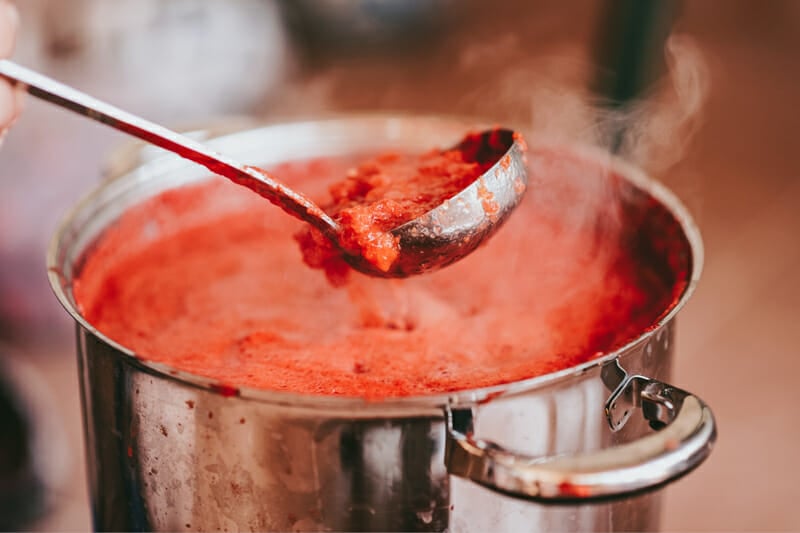
Simmer to Reduce
Continue simmering without a lid until the sauce is reduced by almost half, stirring occasionally, to produce about 12 cups of medium-thick sauce. This should take approximately an hour. Remove dried bay leaf. Taste and adjust salt. For a smoother sauce, stir with an immersion blender.
Tips for Making The Best Homemade Spaghetti Sauce
Suppose you’d like to modify the sauce’s flavor. In that case, you can add some crushed red pepper flakes for heat, some Italian seasoning for a savory flavor, or some nuts like cashews to give it a more nutty and cheesy flavor. Consider this recipe as a base, and feel free to add your unique twist.
If you are vegan or lactose-intolerant, you can use nutritional yeast to add a cheesy flavor to the sauce without parmesan cheese. Just sprinkle it on top of the pasta once it is plated.
If you want to add meat to this dish, consider tossing in some cooked chicken, browned beef, or ground turkey when your sauce has finished reducing.
What do I do with leftover spaghetti sauce?
Canning Spaghetti Sauce
Sterilized 6-pint jars. Add 1 tablespoon of lemon juice to each jar. Fill jars with spaghetti sauce, leaving 1/2″ head space. Cap with lids and bands and process in a boiling water bath for 35 minutes.
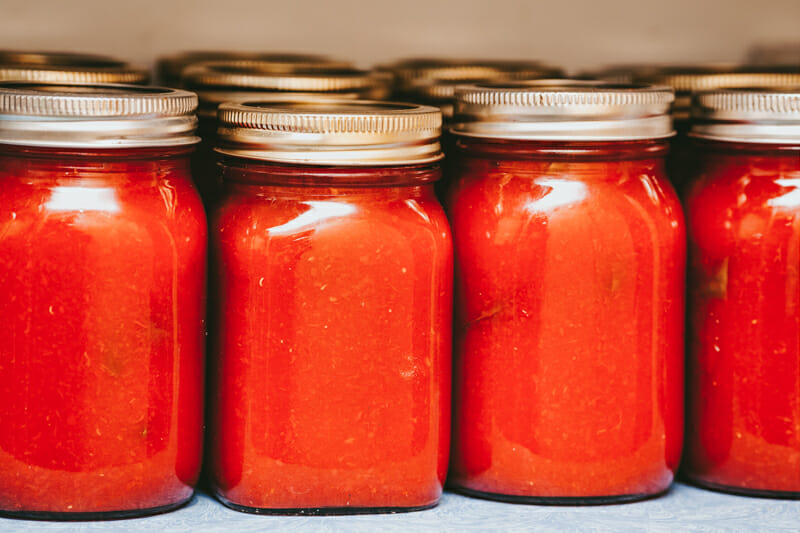
If you added meat to your sauce, the process is a little more complex and requires pressure canning. You can learn more about that here.
Freezing Spaghetti Sauce
Allow your sauce to cool completely before packaging. For larger quantities, place sauce in a quart-size zip-top plastic bag and freeze flat on a baking sheet. Once frozen, you can stack the baggies in the freezer to save space.
FAQs About Making Homemade Spaghetti Sauce
More delicious Pasta Recipes You Should Try!
Lemon Pasta Recipe: A Delicious And Easy Meal
8 ingredients & 40 minutes to make the best lemon pasta! With fresh garlic, olive oil, and Parmesan, and no cream or butter! Recipe from yours truly!
Basil Pesto with Garlic Scapes and Hazelnuts
Basil pesto recipe with a twist. Uses garlic scapes and hazelnuts for a fresh new flavor. Try it over rice or pasta and get excited about pesto again. Recipe from Joybille Farm
30-Minute Italian Sausage Pasta Primavera
Quick, easy, flavorful, and super adaptable to whatever vegetables are in season. You can also make it without the sausage or with chicken or another protein – this is one of those recipes you can make your own. Recipe from An Oregon Cottage
Fideo con Carne (aka: Mexican Pasta)
Fideo is a quick and comforting traditional Mexican dish. There are several variations, but are all based on fideo noodles, which are short, thin noodles similar to vermicelli or angel hair pasta. This fideo con carne (fideo with ground beef) is an easy, one-pot dish that is perfect for busy weeknight dinners. Recipe from Schneider Peeps
If you’ve found value in this blog post and enjoyed reading it, why not share it with your Pinterest community? Pin the image below and spread the love!
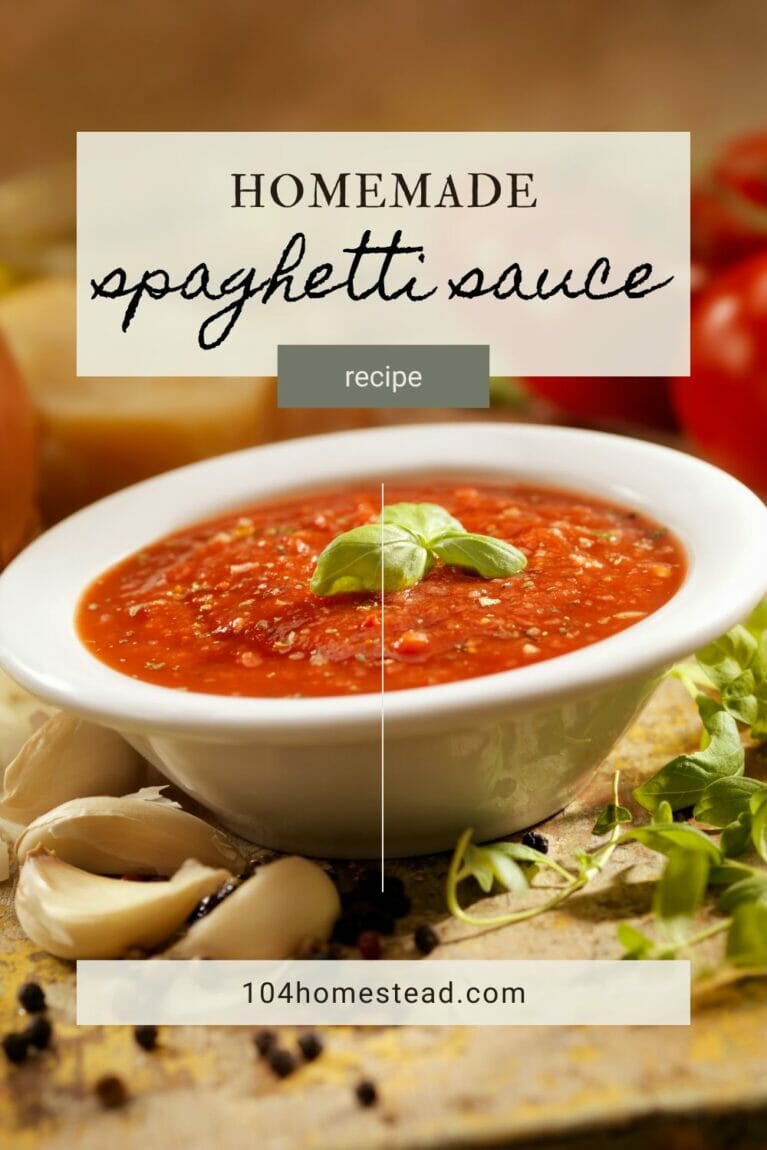
As we wrap up our homemade spaghetti sauce adventure, let’s just take a moment to appreciate the magic that fresh ingredients bring to the table. This sauce, with its mix of tomatoes, herbs, and spices, is like a flavor explosion that turns your everyday spaghetti into a feast. Whether you’re cooking it up for a chill Sunday or a busy weeknight, this homemade goodness beats the store-bought stuff any day.
Drop a comment below with your sauce hacks or family secrets—I’m all ears for some saucy stories!
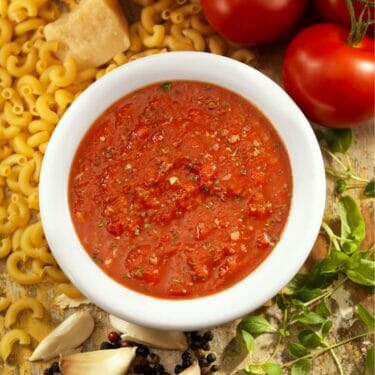
The Best Homemade Spaghetti Sauce Recipe
This post may contain paid links. If you make a purchase using the links in this recipe, I may earn a commission.
Equipment
- Immersion Blender optional
Ingredients
Instructions
- Line a small baking sheet with parchment paper. Place the onions and garlic on the baking sheet, and drizzle with olive oil.
- Roast at 375°F until the onions are tender and golden brown.
- Transfer the roasted onions and garlic to a blender or food processor when done roasting, along with the drained roasted red peppers. Blend until smooth.
- Peel tomatoes. Cut tomatoes in half horizontally and squeeze out the seeds. Cut tomato halves a second time to form quarters.
- Put quartered tomatoes in low sided saucepan or skillet over medium-high heat.
- Pour in the onion and garlic puree. Add salt, olive oil, tomato paste, basil, and bay leaves.
- Bring to a boil, then lower the heat to a brisk simmer.
- Continue simmering without a lid until the sauce is reduced by almost half, stirring occasionally, to produce about 2 cups of medium-thick sauce. This should take approximately 20 minutes.
- Remove dried bay leaf. Taste and adjust salt.

Hi Jessica. I just found your website today as my daughter is hoping to be a stay at home mom with her 2-1/2 year old son and 2 month old daughter. With all your great do it yourself ideas I am hoping they will help her be more self-sufficient and save money so she can stay home with my grandchildren so they don’t have to go to daycare. I too am looking for ideas to be more self-sufficient as I do work outside the home but only part time and want to save money and help my adult children out with homemade food, etc. I do garden and can some but want to lean more. I love being outside! I live in Wisconsin so our winters are comparable. I need hobbies and hope by following you I can eat great ideas.
Thank you
Welcome, Sheila!